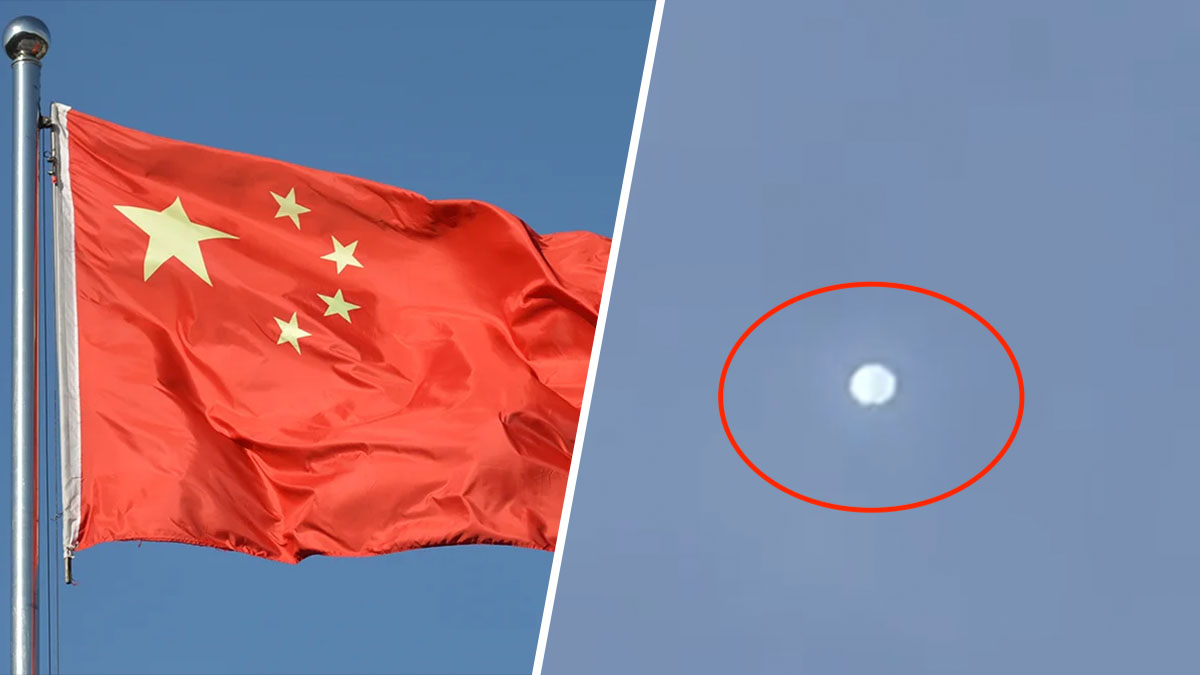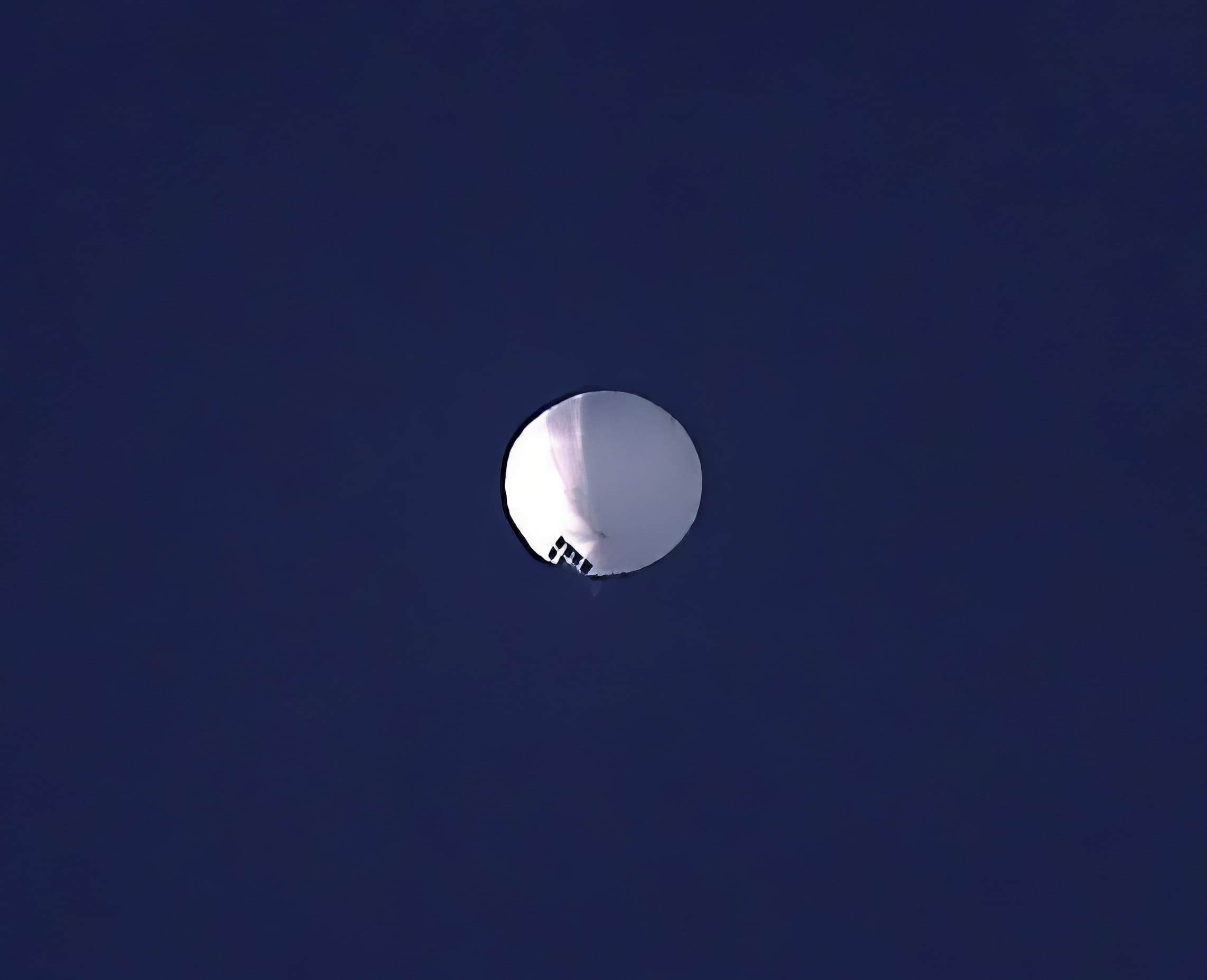The U.S. military on Saturday shot down a suspected Chinese spy balloon off the Carolina coast after it traversed sensitive military sites across North America. China insisted the flyover was an accident involving a civilian aircraft and threatened repercussions.
President Joe Biden issued the order but had wanted the balloon downed even earlier, on Wednesday. He was advised that the best time for the operation would be when it was over water, U.S. officials said. Military officials determined that bringing it down over land from an altitude of 60,000 feet would pose an undue risk to people on the ground.
China responded that it reserved the right to “take further actions” and criticized the U.S. for “an obvious overreaction and a serious violation of international practice.”
In its statement Sunday, China's Ministry of Foreign Affairs said that “China will resolutely uphold the relevant company’s legitimate rights and interests, and at the same time reserving the right to take further actions in response.”
Get top local stories in Connecticut delivered to you every morning. >Sign up for NBC Connecticut's News Headlines newsletter.
The presence of the balloon in the skies above the U.S. this week dealt a severe blow to already strained U.S.-Chinese relations that have been in a downward spiral for years. It prompted Secretary of State Antony Blinken to abruptly cancel a high-stakes Beijing trip aimed at easing tensions.
“They successfully took it down and I want to compliment our aviators who did it,” Biden said after getting off Air Force One en route to Camp David.
The giant white orb was spotted Saturday morning over the Carolinas as it approached the Atlantic coast. About 2:39 p.m. EST, an F-22 fighter jet fired a missile at the balloon, puncturing it while it was about 6 nautical miles off the coast near Myrtle Beach, South Carolina, senior defense officials said.
The spectacle had Americans looking to the skies all week, wondering whether the mysterious balloon had floated over them.
On Saturday, Ashlyn Preaux, 33, went out to get her mail in Forestbrook, South Carolina, and noticed her neighbors looking up — and there it was, the balloon in the cloudless blue sky. Then she saw fighter jets circling and the balloon get hit.
“I did not anticipate waking up to be in a ‘Top Gun’ movie today,” she said.
The debris landed in 47 feet of water, shallower than officials had expected, and it spread out over roughly seven miles and the recovery operation included several ships. The officials estimated the recovery efforts would be completed in a short time, not weeks. A salvage vessel was en route.
U.S. defense and military officials said Saturday that the balloon entered the U.S. air defense zone north of the Aleutian Islands on Jan. 28 and moved largely over land across Alaska and then into Canadian airspace in the Northwest Territories on Monday. It crossed back into U.S. territory over northern Idaho on Tuesday, the day the White House said Biden was first briefed on it.
The balloon was spotted Thursday over Montana, home to Malmstrom Air Force Base, which has fields of nuclear missile silos.
The Americans were able to collect intelligence on the balloon as it flew over the U.S., giving them a number of days to analyze it and learn how it moved and what it was capable of surveilling, according to two senior defense officials said. The officials briefed reporters on condition of anonymity.
The officials said the U.S. military was constantly assessing the threat, and concluded that the technology on the balloon didn’t give the Chinese significant intelligence beyond what it could already obtain from satellites, though the U.S. took steps to mitigate what information it could gather as it moved along.
Republicans were critical of Biden's response.
“Allowing a spy balloon from the Communist Party of China to travel across the entire continental United States before contesting its presence is a disastrous projection of weakness by the White House,” said Mississippi Sen. Roger Wicker, the top Republican on the Senate Armed Services Committee.
Sen. Thom Tillis, R-N.C., tweeted: “Now that this embarrassing episode is over, we need answers from the Biden Administration on the decision-making process. Communist China was allowed to violate American sovereignty unimpeded for days. We must be better prepared for future provocations and incursions by the CCP.”
Sen. Lindsey Graham, R-S.C., was more positive: “Thank you to the men and women of the United States military who were responsible for completing the mission to shoot down the Chinese surveillance balloon. The Biden Administration did the right thing in bringing it down.”
China has claimed that the balloon was merely a weather research “airship” that had been blown off course. The Pentagon rejected that out of hand — as well as China’s contention that it was not being used for surveillance and had only limited navigational ability.
The Chinese government on Saturday sought to play down the cancellation of Blinken's trip. “In actuality, the U.S. and China have never announced any visit, the U.S. making any such announcement is their own business, and we respect that,” China’s Ministry of Foreign Affairs said in a statement.
The Pentagon also acknowledged reports of a second balloon flying over Latin America. “We now assess it is another Chinese surveillance balloon,” Brig. Gen. Pat Ryder, Pentagon press secretary, said in a statement. Officials said the balloons are part of a fleet that China uses for surveillance, and they can be maneuvered remotely through small motors and propellers. One official said they carry equipment in the pod under the balloon that is not usually associated with standard meteorological activities or civilian research.
China’s Ministry of Foreign Affairs did not immediately respond to a question about the second balloon.
This isn’t the first time Chinese spy balloons have crossed into U.S. airspace in recent years, one of the officials said. At least three times during the Trump administration and at least one other time during Biden’s time as president they’ve seen balloons cross, but not for this long, the official said.
Blinken, who had been due to depart Washington for Beijing late Friday, said he had told senior Chinese diplomat Wang Yi in a phone call that sending the balloon over the U.S. was “an irresponsible act and that (China’s) decision to take this action on the eve of my visit is detrimental to the substantive discussions that we were prepared to have.”
Uncensored reactions on the Chinese internet mirrored the official government stance that the U.S. was hyping the situation. Some used it as a chance to poke fun at U.S. defenses, saying it couldn’t even defend against a balloon, and nationalist influencers leaped to use the news to mock the U.S.
China has denied any claims of spying and said it is a civilian-use balloon intended for meteorology research. The Ministry of Foreign Affairs emphasized that the balloon’s journey was out of its control and urged the U.S. not to “smear” it because of the balloon.
In preparation for the operation Saturday, the Federal Aviation Administration temporarily closed airspace over the Carolina coast, including the airports in Myrtle Beach and Charleston, South Carolina, and Wilmington, North Carolina. The FAA rerouted air traffic from the area and warned of delays as a result of the flight restrictions. The FAA and Coast Guard worked to clear the airspace and water below the balloon as it reached the ocean.
Television footage showed a small explosion, followed by the giant deflated balloon descending like a ribbon toward the water.
Bill Swanson said he watched the balloon deflate instantly from his house in Myrtle Beach as fighter jets circled around.
“When it deflated it was pretty close to instantaneous,” he said. “One second it’s there like a tiny moon and the next second it’s gone.” Swanson added that a trail of smoke followed the balloon as it dropped.
Read More
___
Associated Press writers Chris Megerian and Tara Copp in Washington, Huizhong Wu in Taipei and researcher Henry Hou in Beijing contributed to this report.



